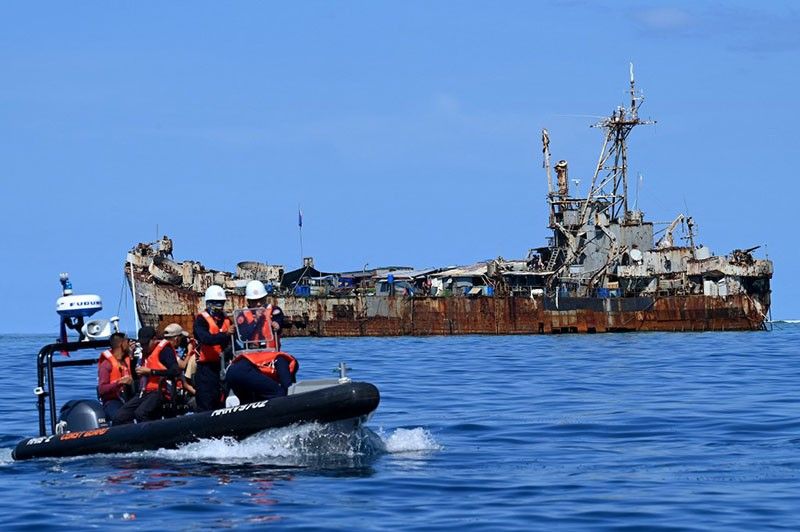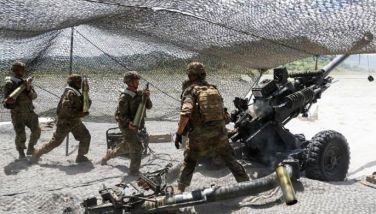Reinforcing external defense capabilities to defend West Philippine Sea

The Philippines has long been a staunch advocate of the rule of law. It is the rule of law that binds our international community, ensuring that peace, prosperity, stability and security prevail. Adherence to its fundamental tenets enables all states to exercise freedom and enjoy the liberties that this entails.
The significance attributed to international law was illustrated when the Philippines instituted arbitral proceedings against China under the United Nations Convention on the Law of the Sea. Its power was illustrated when the Philippines was accorded with the arbitral award in 2016.
This marked a momentous occasion for both the Philippines and the international community. For the Philippines, the arbitral award reaffirmed its stance on the West Philippine Sea. For the international community, the award embodied that in the eyes of international law, all states are equal.
The landmark ruling fortified the resolve of the whole of society to protect and defend its sovereignty and territorial integrity in the West Philippine Sea. It also emboldened like-minded partners to take a stand and declare support for the Philippines’ victory.
Today, the rule of law is threatened by aggressive, coercive, and deceptive actors. Manila remains confronted by asymmetric security challenges in the West Philippine Sea. Specifically, it finds itself contending with gray zone tactics and disinformation campaigns that undermine its sovereignty, maritime rights, and economic freedom.
On the eighth anniversary of the arbitral award, the Philippines remains steadfast in defending its rights within its territory. The government’s position is firm: it will not yield nor sit idly by as our territory is encroached upon and the well-being of Filipinos is threatened.
Spearheading the frontlines are the Armed Forces of the Philippines and the Philippine Coast Guard. Their efforts include joint patrols with like-minded partners, and rotation and reprovision missions, among others.
Supporting our Filipino troops in their efforts to modernize and upscale external defense capabilities is crucial to safeguard our maritime nation.
Filipinos believe that the current administration must reinforce the country’s external defense strategies and capabilities as illustrated by a Stratbase ADR Institute-commissioned survey, conducted by Pulse Asia Research Inc. last June 17 to 24.
The survey revealed that 51% of Filipinos believe that reinforcing the alliance and elevating partnerships by conducting joint patrols and military exercises with allies, friends, and partners is a key measure that Manila must take. It also showed 50% of Filipinos supporting the modernization of the Armed Forces of the Philippines to protect our territory and marine resources in our exclusive economic zone.
At the conference entitled “The 8th Year of the Arbitral Victory: A Collective Pursuit of Maritime Security in the West Philippine Sea” organized by the Stratbase ADR Institute in partnership with Australian Embassy in the Philippines and US Embassy in the Philippines, we were once again assured that the Philippine military would stand its ground in the defense of the country.
In his remarks, Presidential Office for Maritime Concerns Secretary Andres Centino stated that the “commemoration of the eighth anniversary of the 2016 arbitrary ruling on the West Philippine Sea reminds us that the Philippines will remain committed to defending our sovereign rights and jurisdiction within our maritime zones.”
He emphasized that working with partners and integrating both national and international efforts are key to promoting the country’s national interests in the West Philippine Sea. Furthermore, Centino shared plans of crafting a comprehensive national maritime security and policy which seeks to guide the country’s vision of a secure maritime state.
These sentiments were echoed by RADM Roy Vincent Trinidad, Naval Inspector General and spokesperson for the West Philippine Sea of the Philippine Navy. He stressed that the “being at the frontline of China’s expansionist ambitions, the Philippines will continue to stand strong in ensuring that international law will prevail.”
He also noted the importance of strategic communications in delivering the right message to the public. Gathering the support of the Filipino people, alongside that of the international community, is crucial as the Philippines pursues a robust defense posture.
For his part, Air Defense Commander MGen. Fabian Pedregosa of the Philippine Air Force reiterated the commitment of the Air Force to the defense of the country. He said that “the Philippine Air Force will continue to stand vigilant, protecting our skies and supporting our maritime forces, ensuring that our nation remains secure and prosperous. The Philippine Air Force and the whole AFP is committed and vow to protect our seas, our rights, and our future.”
Meanwhile, Coast Guard Commandant ADM Ronnie Gil Gavan discussed the importance of coast guard diplomacy in maritime security. He urged for holistic collaboration stating that maritime security does not belong to the uniformed services alone. He stated that “at the end of the day, we [the uniformed services], will only be a function of you [the Filipino people].”
These statements illustrate coordinated efforts to safeguard the country’s territory between military and civilian agencies.
A common thread links the statements of the four officials -- a call for comprehensive and collective effort within the country and beyond to ensure that the arbitral victory is upheld.
As the Philippine military does its part through engaging in capacity building efforts, conducting regular maritime and air patrols, and establishing interoperability with friends, partners, and allies, the Filipino public must also do its part.
All efforts, whether big or small, create a domino effect of impact on securing the West Philippine Sea, promoting stability in the region, and protecting the rule of law. The Philippines’ victory serves as a beacon that binds our maritime nation and fosters cooperation among like-minded partners. Any attempt to ignore, belittle, or dismiss it, as China irresponsibly does, will be fruitless so long as we stand united.
--
Katrina Guerrero is a Program and Research Manager for Defense and Security at think tank Stratbase ADR Institute.
- Latest




























